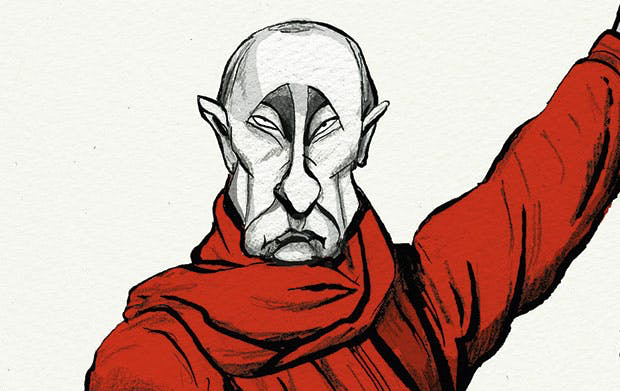Never one to let a bandwagon pass by, Vladimir Putin launched his own national vaccine program the moment Britain said it was starting its roll-out. Given how badly Russia has been hit, you would expect it to be a popular move. But Russians themselves seem cautious, not least because they mistrust the Kremlin.
On Thursday, Russian health officials announced a new record of more than 28,000 coronavirus cases reported in a single day, bringing the total caseload to almost 2.4 million. Russia has the world’s fourth-worst case numbers, behind only the US, India and Brazil, with over 41,000 deaths to date. Or at least 41,000 according to official statistics — confidential documents leaked to the press suggest the real figure is at least 75,000.
This points to a particular problem in Russia where a combination of reluctance to admit mistakes at the top of the system and a culture of cover-up in the regions means the government is often working off inaccurate data and the population habitually mistrusts the official line.
That mistrust is already evident in reactions to Russia’s own, much-vaunted Sputnik V vaccine. Its developers claim it is 95 percent effective after a second dose. The trouble is that the process looks to many like it’s been rushed and is based on too small a sample. This caused initial controversy, although the science seems sound and the general international consensus appears to be that it should perform to, or close to, those claims, and is both relatively cheap and easy to store and transport.
Nonetheless, a survey by the independent Levada Center found that as of October, 59 percent of respondents were unwilling to take the vaccine — and that number appears to be growing. By comparison, only 21 percent would similarly be disinclined in the UK. Of course, the Brits are not being offered Sputnik V.
In part, Russian reticence reflects a specific concern about their vaccine. Russians are rightly proud of their scientific advances — and by choosing to name this vaccine after the Soviet-developed satellite, the first to be blasted into space, the developers hoped to cash in on this sentiment. But Russians have also learnt to be suspicious of bullish official claims.
This is especially true of everything COVID-related. Putin was late and reluctant even to admit that there was a problem, having to be all but forced into it by Sergei Sobyanin, mayor of Moscow. He himself has retreated into careful seclusion. Those due to meet Putin have to quarantine for two weeks and also pass through a tunnel filled with disinfectant fog. Perhaps most strikingly, Putin has not taken the vaccine. Even though 100,000 Russians at high risk have already been given Sputnik V, and one of Putin’s own daughters took it at trial stage.
[special_offer]
However, this mistrust also reflects a general lack of faith in ‘them’ — whoever they may be. Surveys show consistently low levels of trust in institutions from the media to the police, and even Vladimir Putin’s personal ratings tend to show higher levels of approval than trust. (Which raises the paradox that it means a sizable number of Russians approve of, but do not trust, him.)
This is even a problem for the military. The generals are already looking to the spring draft, when around 140,000 young men are due to be called up for their national service. Plans have been announced to vaccinate 400,000 servicemen, but that is out of a total military establishment of almost a million. Now, there are concerns of inadequate anti-pandemic precautions and even the risk of protests against the draft.
Moscow’s first vaccination centers are due to open on Saturday, and no doubt there will be a massive media campaign to encourage take-up, combined with pressure on government employees to take the jab. Assuming Sputnik V lives up to its billing, it is undoubtedly a great step forward in Russia’s efforts to control the virus. But the resistance to the program is an entirely self-inflicted problem. It is the result of naked hype about Russia’s own vaccine and the public quietly knowing only too well that they have been lied to for decades.
This article was originally published onThe Spectator’s UK website.

























